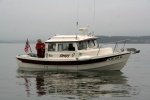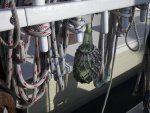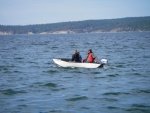Hunkydory
Active member
- Joined
- Mar 28, 2005
- Messages
- 2,745
- Reaction score
- 15
- C Dory Year
- 2000
- C Dory Model
- 22 Cruiser
- Hull Identification Number
- DOR22916I000
- Vessel Name
- Hunkydory
rogerbum":3otbtadr said:I agree Jay. However, I find that "the innate ability to have a clear mind & not freeze when confronted with a rapidly changing situation..." is directly correlated with the number of times one has thought about the possible things that could go wrong and how they would respond. In some cases, that means I carry safety gear that others would feel is in excess. In other cases it means I'll do something that other might not do or that others might think is counter intuitive.
For example, if for some reason I manage to fall over, it's drilled into my head that the first thing I must do is get a few quick strokes in to get away from the boat (the props, the fishing gear, the downriggers etc). This is counter to what one might do if you haven't thought it through and drilled the correct response into you head. Of course this means that I would then have to count on others on the boat to return to me and that of course means that I have to train them on how to do that (preferably this training takes place while I'm not in the water). It also means that they need to know where the heaving line is and how to use it. It also means that they have to know where the boarding ladder is and how to deploy it. It also means that they might have to call the coast guard so they have to know how to use the VHF.
This one scenario, when thought through, implies a bunch of actions I have to take in advance in order to increase my odds of recovery. While this scenario, isn't applicable to single handing, the idea that one think through possible/reasonably high probability problems, and then figure out to either manage the risk or respond in advance applies to many potential situations. None of my disaster scenario thinking makes me less willing to use the boat. In fact it has the opposite effect (like you state) as it mentally allows me to fully enjoy the boat.
Roger, yes I agree there is a correlation with your well described scenario & how it branches out to many others too & how thinking different things through that could possibly happen can increase the chances of a clear mind having pre thought choices to execute thus helping the outcome of these situations. I do this too & it does bring on the ability to at times do it subconsciously, such as, driving defensibly on the highway, which as you stated can make the trip more enjoyable. My thought was more of a caution to those who don't know if they can remain clear headed to do some introspection & if not to just enjoy their boat with the knowledge of the actual risk involved. Perhaps it should have more directed to the correlation between pre thinking & doing.
The more one does things like those of you, heading far out off shore or Kushtaka & I & others going to very remote places or most any single handling where self reliance is paramount the more one should know about there own abilities & improve the ones they can, so to be better prepared for whatever may happen. I believe many will never know if they can be clear headed & do exactly what they need to do, even if thought through before, when faced with a life or death situation if they haven't experienced it, but lessor experiences can give a clue. Not boating, but still an example of such an experience is one of my mountain exploring walk-abouts high in the Rocky Mountains with no one knowing where I was & involving being on a cliff face alone in this wilderness with just enough drop below to not guarantee death but absolutely serious injury with 0% chance of making it climbing back down being as my only rope was a light one for pulling up behind me my 30 lb pack & very slim of continuing up with no chance without complete concentration on technique, while totally ignoring what easily could be dehabiltating fear. One, such as I, who have made it through several of these kind of experiences at least knows they have that ability within them. Those who don't or have failed in less dire situations, need to try their best to keep away from them or prepare more as you suggested for them. Overall, I feel for most the danger of boating in a C-Dory boat is very low compared to many other activities done routinely.
Kushtaka, do you go up the Copper River all the way to Chitina? Is it in your C-Dory or some other boat? Do you start from the open ocean or launch along the river from the road to Child's Glacier & the million dollar bridge. I have stood on the Copper River bank across from the Glacier & in the middle of the bridge & in any boat going up & down that river with the ice & fast silty glacier water deem it an exceptional undertaking & would like to read more about how you do it.
Jay




